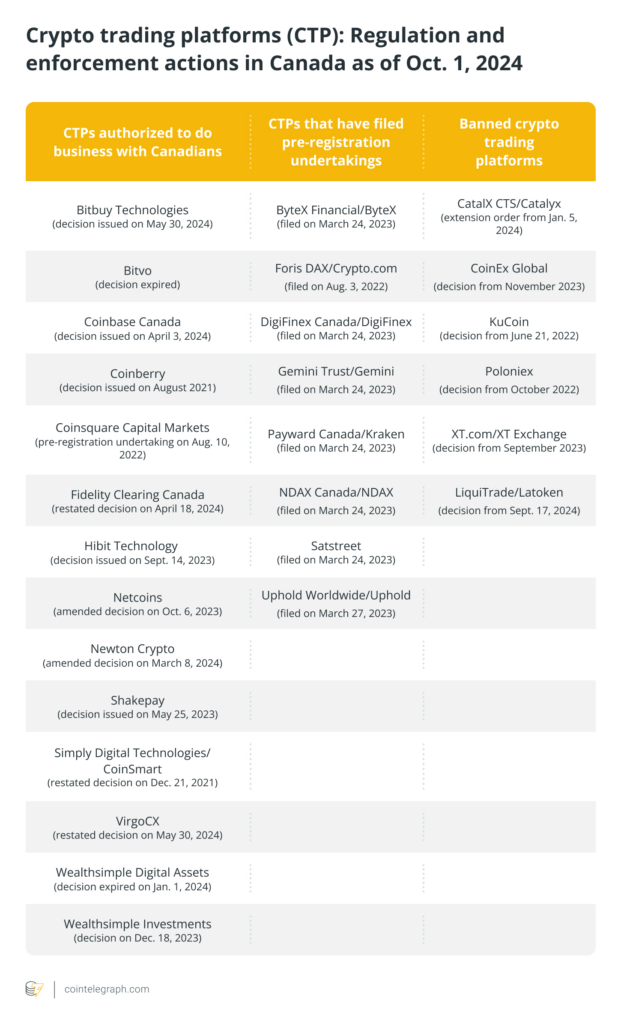The users of Gemini in Canada, a cryptocurrency exchange created by Cameron and Tyler Winklevoss, were informed that the platform would close on September 30.
Only a few days later, they were passed after the Canadian Securities Administrators updated cryptocurrency trading companies on stablecoins when Gemini announced its departure.
There have been a lot of inquiries concerning Gemini’s departure grounds since the abrupt change. Simultaneously, the Canadian government has been enforcing stricter rules on the cryptocurrency sector, leading some exchanges to exit the country.
What are the new cryptocurrency restrictions in Canada, and why have certain exchanges chosen to withdraw from the market? This article investigates the leading causes of these changes.
CSA has moved the deadline for compliance to December 31.
Gemini’s withdrawal occurred just a few days after, on September 26, the Canadian Securities Administrators (CSA) updated cryptocurrency trading platforms (CTP) with information about stablecoins, also known as value-referenced crypto assets (VRCA).
The deadline by which CTPs would no longer be permitted to offer stablecoins that do not adhere to appropriate terms and conditions by the CSA was once again extended by the regulator in the update.
The CSA originally asked that exchanges comply by April 30, 2024; however, citing technological challenges with compliance, the deadline was pushed to October 31. The regulator then informed the public on September 26 of extending the deadline, which called for CTPs to comply by December 31, 2024.

The CSA stated that the extension’s purpose is to provide CTPs additional time to either adhere to their registration or pre-registration undertaking (PRU) requirements or to submit substitutes that address investor protection issues. It also stated:
“Even if a specific VRCA meets the terms and conditions of an applicable registration, exemptive relief decision or PRU, it does not mean the CSA approves or endorses the VRCA, endorses its safety, or that it is compliant with Canadian securities laws.”
The CSA first prohibited stablecoin trading in December 2022 because they might be classified as securities or derivatives. Subsequently, the regulator clarified that subject to specific requirements, such as transparency and certified custodian services, it might permit the trade of particular stablecoins.
Which cryptocurrency companies can operate in Canada?
At least 12 cryptocurrency exchanges are now permitted to operate in the nation, with decisions made by local regulators still in effect, according to the official records of the CSA.
These exchanges include Shakepay, Wealthsimple Investments, Netcoins, Newton Crypto, Fidelity Clearing Canada, Bitbuy Technologies, Coinbase Canada, Coinberry, and more.
A list of cryptocurrency companies, including exchanges like ByteX, Crypto.com, DigiFinex, Gemini, Kraken, NDAX, Satstreet, and Uphold, that have applied for PRUs is also available from the CSA.

The CSA stated that “filing a PRU does not guarantee a platform will be granted registration” and that PRUs from unregistered crypto asset trading platforms nevertheless include “significant investor protection commitments.”
A list of cryptocurrency companies that had their operations banned in several Canadian jurisdictions was also made available by the CSA. The companies on the “Banned crypto trading platforms” list include XT.com, LiquiTrade, KuCoin, Catalyx, CoinEx Global, and Poloniex.
Coinbase advocated for opening up shop in Canada by 2024.
Some exchanges, like Coinbase, have actively sought to increase their local presence even if Gemini quit Canada.
Coinbase revealed intentions to launch a stablecoin backed by the Canadian dollar on its platform known to the public in April 2024. The business was previously able to conduct business in Canada thanks to a restricted dealer license that it obtained.

Coinbase’s entry into the Canadian market occurred approximately one month before Binance, a significant rival, formally announced its plan to leave the nation in May 2023. Binance especially mentioned problems caused by the CSA regulations, which obliged the exchange to submit a PRU application and adhere to new guidelines.
In 2023, several other cryptocurrency businesses decided to leave Canada due to changes in the regulatory landscape, including OKX, dYdX, Paxos, and Bybit.
People on social media hypothesized that adopting stablecoins as the primary trading pair by exchanges like Binance may have contributed to their departure. Some speculated that the usage of the now-defunct stablecoin Binance USD and Tether’s USDt USDT$0.9999 could be the cause of the departures.
Although many people have connected USDT to Canadian regulatory problems, stablecoin is still allowed in Canada. However, a statement from Netcoins states that USDT is not permitted as part of the limited dealer’s license. In 2023, prominent trading platforms such as Kraken and Coinbase removed USDT from their Canadian listings.
